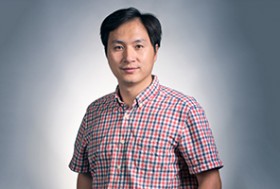More Frankenstien;
EXCLUSIVE: Chinese scientists are creating CRISPR babies
A daring effort is under way to create the first children whose DNA has been tailored using gene editing.
When Chinese researchers first edited the genes of a human embryo in a lab dish in 2015, it sparked global outcry and pleas from scientists not to make a baby using the technology, at least for the present.
Recommended for You
It was the invention of a powerful gene-editing tool, CRISPR, which is cheap and easy to deploy, that made the birth of humans genetically modified in an in vitro fertilization (IVF) center a theoretical possibility.
Now, it appears it may already be happening.
According to Chinese medical documents posted online this month (here and here), a team at the Southern University of Science and Technology, in Shenzhen, has been recruiting couples in an effort to create the first gene-edited babies. They planned to eliminate a gene called CCR5 in hopes of rendering the offspring resistant to HIV, smallpox, and cholera.
 Jiankui He leads a team using the gene-editing technology CRISPR in an effort to prevent disease in newborns.
Jiankui He leads a team using the gene-editing technology CRISPR in an effort to prevent disease in newborns.The clinical trial documents describe a study in which CRISPR is employed to modify human embryos before they are transferred into women’s uteruses.
It is unclear if any children have been born. The scientist behind the effort, Jiankui He, did not reply to a list of questions about whether the undertaking had produced a live birth. Reached by telephone, he declined to comment.
However, data submitted as part of the trial listing shows that genetic tests have been carried out on fetuses as late as 24 weeks, or six months. It’s not known if those pregnancies were terminated, were carried to term, or are ongoing.
The birth of the first genetically tailored humans would be a stunning medical achievement, for both He and China. But it will prove controversial, too. Where some see a new form of medicine that eliminates genetic disease, others see a slippery slope to enhancements, designer babies, and a new form of eugenics.
“In this ever more competitive global pursuit of applications for gene editing, we hope to be a stand-out,” He and his team wrote in an ethics statement they submitted last year. They predicted their innovation “will surpass” the invention of in vitro fertilization, whose developer was awarded a Nobel Prize in 2010.
Gene-editing summit
pullquote-style--defaultpullquote-size--default" data-widget-type="quote" data-widget-layout="left-col">The step toward genetically tailored humans was undertaken in secrecy and with the clear ambition of a stunning medical first.
The evidence that China is on the cusp of making genetically altered humans, if it hasn’t already, comes just as the world’s leading experts are jetting into Hong Kong for the Second International Summit on Human Genome Editing.
The purpose of the international meeting is to help determine whether humans should begin to genetically modify themselves, and if so, how. That purpose now appears to have been preempted by the actions of He, an elite biologist recruited back to China from the US as part of its “Thousand Talents Plan.”
The technology is ethically charged because changes to an embryo would be inherited by future generations and could eventually affect the entire gene pool. “We have never done anything that will change the genes of the human race, and we have never done anything that will have effects that will go on through the generations,” David Baltimore, a biologist and former president of the California Institute of Technology, who chairs the international summit proceedings, said in a pre-recorded message ahead of the event, which begins Tuesday, November 27.
It appears the organizers of the summit were also kept in the dark about He’s plans.
Regret and concern
The genetic editing of a speck-size human embryo carries significant risks, including the risks of introducing unwanted mutations or yielding a baby whose body is composed of some edited and some unedited cells. Data on the Chinese trial site indicate that one of the fetuses is a “mosaic” of cells that had been edited in different ways.
A gene-editing scientist, Fyodor Urnov, associate director of the Altius Institute for Biomedical Sciences, a nonprofit in Seattle, reviewed the Chinese documents and said that, while incomplete, they do show that “this effort aims to produce a human” with altered genes.
Urnov called the undertaking cause for “regret and concern over the fact that gene editing—a powerful and useful technique—was put to use in a setting where it was unnecessary.” Indeed, studies are already under way to edit the same gene in the bodies of adults with HIV. “It is a hard-to-explain foray into human germ-line genetic engineering that may overshadow in the mind of the public a decade of progress in gene editing of adults and children to treat existing disease,” he says.
Big project
In a scientific presentation in 2017 at Cold Spring Harbor Laboratory, which is posted to YouTube, He described a very large series of preliminary experiments on mice, monkeys, and more than 300 human embryos. One risk of CRISPR is that it can introduce accidental or “off target” mutations. But He claimed he found few or no unwanted changes in the test embryos.
He is also the chairman and founder of a DNA sequencing company called Direct Genomics. A new breed of biotech companies could ultimately reap a windfall should the new methods of conferring health benefits on children be widely employed.
According to the clinical trial plan, genetic measurements would be carried out on embryos and would continue during pregnancy to check on the status of the fetuses. During his 2017 presentation, He acknowledged that if the first CRISPR baby were unhealthy, it could prove a disaster.
“We should do this slow and cautious, since a single case of failure could kill the whole field,” he said.
You need to be a member of Ashtar Command - Spiritual Community to add comments!
Replies